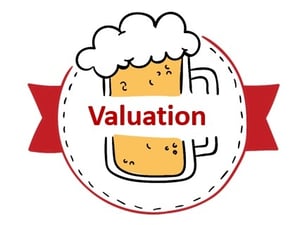 Whether you’re looking to buy a brewery, sell a brewery, gift some ownership to a partner or successor, or are just plain curious, the question of value is of primary concern. Ask any valuator worth their salt and he or she will tell you, valuation is an art, not a science.
Whether you’re looking to buy a brewery, sell a brewery, gift some ownership to a partner or successor, or are just plain curious, the question of value is of primary concern. Ask any valuator worth their salt and he or she will tell you, valuation is an art, not a science.
There is no black and white formula for determining what a brewery is worth. However, there are time tested and generally accepted methods within which one can work to derive a fair value.
The term value can sometimes be construed as vague and somewhat illusive, but within the constructs of valuation, it is more narrowly defined as “fair market value.” Fair market value, which is the standard of valuation, is defined in IRS Revenue Ruling 59-60 as:
The price at which the property would change hands between a willing buyer and a willing seller when the former is not under any compulsion to buy and the latter is not under any compulsion to sell, both parties having reasonable knowledge of relevant facts.
Court decisions frequently state in addition that the hypothetical buyer and seller are assumed to be able, as well as willing, to trade and to be well informed about the property and the market for such property. There are numerous methods by which to conduct a formal valuation, so one of the first steps that should be taken is to determine the most appropriate valuation method for the business being valued.
Valuation Methods
There are three approaches to valuing the interest of closely-held businesses, which your brewery likely is. They are:
- Asset-based approach: This reviews the balance sheet, types of assets (specialty, real estate), intangible assets and goodwill (brand, intellectual property, brewing methods).
- Income-based approach: This is margin based, and considers sales versus cost of goods sold per product lines. This also would include the types of beers being created, ingredients used and sources for said ingredients.
- Market-based approach: This involves guideline transactions, including publicly-traded transactions or prior stock or valuation occurrence. The wine industry has similar industry guidelines, and this will take into account taprooms versus food services.
READ MORE: New Federal Tax Law Cuts Taxes for Most Brewers, Vintners & Distillers
 Unique Valuation Factors for Brewers
Unique Valuation Factors for Brewers
Like many industries, there are unique valuation factors for brewers. Here are some of them:
- Product life cycle and capacity considerations: This includes what types of beer are being produced, is there capacity for increased demand or additional production creation, how long of a timeline from production to sales.
- State-specific franchise law: These govern ways your products can be distributed, which affects your value.
- Three-tiered distribution system: This federal law set up after the repeal of prohibition also affects your value. Breweries, wholesalers and distributors are all affected by ownership of right by location and geographic area.
- Regulatory requirements: Permits, licenses, TTB and Coda requirements, income taxes, federal and state brewery tax requirements all also affect your value.
READ MORE: Top 10 Tax Tips for Beer Brewers
Key Drivers in Valuation
Many factors go into the value of your brewery – some of the key ones include your capacity, employees, product reputation and cash flow:
- Cash flow: A positive cash flow enables a brewery to operate, grow and invest without requiring additional capital investment. You can improve your cash flow by segmenting and tracking products lines and related margins to analyze profitable and non-profitable lines .
- Capacity: Owners and brewmasters should be keyed into their business capacity, including which types of equipment are owned, and allow for how much and how often brewing can occur. Consider additional working capital and expenditures requirements in place or needed to take advantage of ever-changing demand and customer preference in the market. Where is the existing cash flow in the business product lines and what are the market segments being targeted presently and in the future?
- Key people/brewmaster: What is the structure of the business and how has it evolved since formation? What expertise is associated with the individuals driving business decisions? Is the brewmaster the founder of the business who makes all business decisions and operations with a lean staff, or are the various owners who control the business decisions with a brewmaster who focuses strictly on brewing the beer? If the brewmaster is a non-owner, are they the ones deciding which segments to penetrate? What happens to the brewery if the brewmaster leaves the business?
- Business intelligence: This includes current production and existing capacity, capital expenditure necessary to increase production and revenue. It also involves product lines measured and broken out, distribution strategy and options, self-distribution and separate sales teams.
- Product: This includes your placement in the market, brand recognition, brewing time and lifecycle of products and ability to adapt to changing consumer preference.
Clearly, the topic of valuation is a complicated one. While getting it exactly right is almost impossible given the immense subjectivity of the endeavor, getting the best possible price relies on the thoroughness of the work being done.
This of course means having a talented and qualified CPA in your corner is a must! Please contact us if you have any questions about the value of your brewery.





